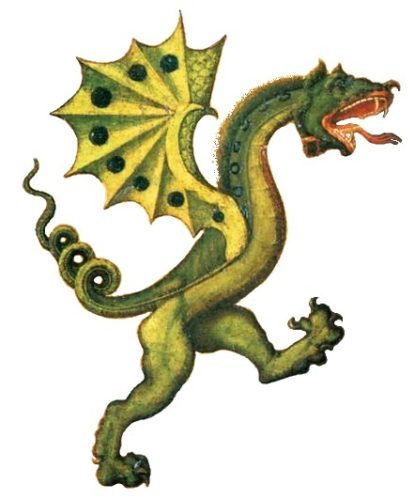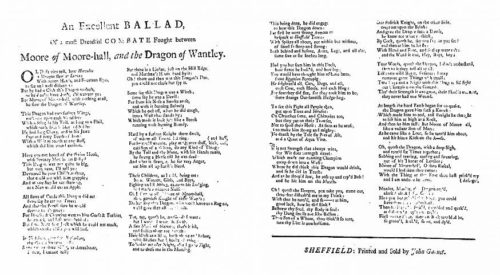Of course there were dragons—that’s how I introduce
Jane Austen’s Dragons.
It is rather a bold claim. How can I say that? I confess, you’re not the first person to ask me that with a decidedly skeptical look. After all, you’ve devoured ever one of Austen’s works cover to cover, multiple times and there’s nary a dragon scale from “It’s a truth universally acknowledged to… “With they Gardiners they were on most intimate terms…”
On the surface, I would agree, it seems that way. But, there is more than meets the eye. There a few more truths universally acknowledged that place dragons firmly in Jane Austen’s world.
Dragons of Jane Austen's World
Let’s begin at the beginning: Jane Austen was very likely to have been very aware of dragons.
Why? Because England’s history is chock full of dragons. Literally everywhere. Don’t believe me? Take a look.
Let’s start with
Uther Pendragon, father of King Arthur. Then there’s Beowulf, of course, and the tale of St. George and the Dragon.
It isn’t a huge leap to believe that Austen was familiar with these myths.
But wait, there’s more! Lambton, the village outside Pemberley had a dragon:
The Lambton Wyrm.
Then there’s the
Mordiford Dragon who was cared for by a girl, in Herefordshire (very similar to Hertfordshire, right?) reminiscent of Elizabeth Bennet.
A Trip Down the Research Rabbit Hole
In my upcoming addition to
Jane Austen’s Dragons, I was researching an estate in the north of England, Nunnington, so I could get some important details right. Low and behold, that research rabbit hole led me straight to a dragon!
Yorkshire Legends and Traditions by Reverend Thomas Parkinson, in 1888, recounts the lore of a dragon that terrorized a wooded area in the parish of Stonegrave, an area later known as Loschy Hill. The dragon was slain by Peter Loschy who died from the dragon’s poison. The brave knight is buried where? At All Saint’s Church … the parish church at Nunnington!
In the church, there is a grave in the south wall of the nave, with a carved knight effigy said to be Peter Loschy and his faithful dog. Even better though, historical fact tells us that the grave really belongs to Sir Walter de Teyes, who was married to Isobel Stonegrave who inherited Nunnington. He was lord of the manor through her, and served a joint Governor of York in 1309.
Why is this better? It suggests (at least in this writer’s brain) a cover up—a convenient story to hide the truth of what really happened with the dragon of Nunnington.
Local dragons don’t stop there—this is just a sample of the dragon myths of Britain.

- The Dragon of Unsworth
- The Dragon of Wantly
- The dragon of Longwitton
- The Bisterne Dragon
- The Worm of Linton
- The Stoor Worm
- The Sockburn Worm (or Wyvern)
- Blue Ben
- Lyminster Knucker
What is more, these stories were passed down through oral tradition, both in story and ballad form until literacy became a thing. Once it did, along about the late 1600’s, those traditional ballad lyrics were published in “broadsheets” or “broadside ballads” and in newspapers. People knew these songs and stories and kept them alive through the ensuing centuries.
[caption id="attachment_106964" align="aligncenter" width="711"]

Ballad of the Dragon of Wan ley Ebba ID 121 British library Roxburghe 3.626-627[/caption]
EBBA ID: 31321 British Library - Roxburghe 3.626-627]
What would Austen have done with Dragons?
That means it is likely that Jane Austen was familiar with many of these dragon legends. If mash-ups had been a thing in her day, I’d be quite willing to bet that dragons would have been one of her first thoughts simply because they were so prevalent in local imaginations.
How might such a mash-up work? Consider: what if
Uther Pendragon saw a real dragon, not a dragon-shaped comet? Would not others have seen it too? Well, no, not if the dragons had a way of hiding in plain sight that only a select few people could see through and Uther was one of those. Perhaps he might have founded an Order whereby dragons and humans could live together peaceably. Perhaps all those myths of slain dragons were actually cover for dragons joining that Order and ceasing from their terrifying ways. What might that Order look like in the Regency era, with dragons in the land and peers and gentry managing dragons?
So that’s what Jane Austen’s Dragons does, shining a light into the secret world of the dragons in Jane Austen’s England and the role they played in her works.
So, Of Course There Were Dragons!
I dare you! Come along and take the plunge! Take a chance on an entirely different take on Austen’s world that is truly in keeping with world she knew.
Check
HERE To learn more! Click the image below to check out the series.



 Ballad of the Dragon of Wan ley Ebba ID 121 British library Roxburghe 3.626-627[/caption]
EBBA ID: 31321 British Library - Roxburghe 3.626-627]
Ballad of the Dragon of Wan ley Ebba ID 121 British library Roxburghe 3.626-627[/caption]
EBBA ID: 31321 British Library - Roxburghe 3.626-627]


 Ballad of the Dragon of Wan ley Ebba ID 121 British library Roxburghe 3.626-627[/caption]
EBBA ID: 31321 British Library - Roxburghe 3.626-627]
Ballad of the Dragon of Wan ley Ebba ID 121 British library Roxburghe 3.626-627[/caption]
EBBA ID: 31321 British Library - Roxburghe 3.626-627]



Oooh, interesting about the Nunnington cover-up. Love your dragons, Maria!
ReplyDelete#WalkerFan
Maria Grace is an impeccable researcher!
ReplyDeleteThanks for explaining the logic behind the inspiration! I *had* wondered what inspired you to add dragons, if it was a brilliant whim or what. I'm so excited to learn about this Dragon of Mordiford tale- what a gem!
ReplyDeleteSo fascinating. I love the series and the idea behind it
ReplyDelete